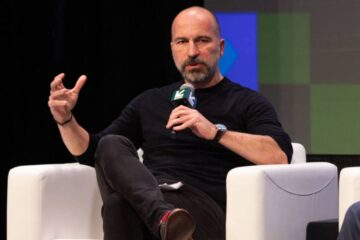The word of the month? Tariffs. Everyone is debating them. Some believe they’re the best way to strong-arm a return to manufacturing dominance, while others worry they’ll spark inflation and send America headlong into a recession.
Like most things, the reality is likely somewhere in the middle. Some industries will likely see manufacturing rekindled, and import tariffs are inflationary, which is a headwind to economic growth.
Related: Major analysts revamp gold price targets after historic rally
Regardless, President Trump’s inflation announcements this month haven’t been well received by investors, who largely appear to be siding with the tariff opponents.
Since unveiling a 10% baseline tariff and reciprocal tariffs on April 2, the S&P 500 and technology-laden Nasdaq Composite have sold off by 4.6% and 4.4%, respectively, despite a substantial oversold rally of about 10% since April 8.
Tariffs’ impact on stocks is likely not lost on long-time fund manager Ken Fisher, the billionaire founder of Fisher Investments, which has $295 billion in assets under management.
Fisher has made a series of blunt comments about tariffs investors may want to consider, given that he’s been investing professionally since founding Fisher Investments in 1979.
The stock market has sold-off on growing recession fears following new tariffs on U.S. imports.
Michael M. Santiago/Getty Images
The U.S. economy faces a host of stiff headwinds
The Federal Reserve has a dual mandate to target low inflation and unemployment. Unfortunately, those two goals often run counter to one another. When the Fed hikes rates, it slows economic activity, causing job losses, and when it cuts rates, it sparks activity, fueling inflation.
Over the past three years, we’ve seen this dynamic play out in real-time. The Fed embarked on a series of significant rate hikes in 2022 to wrestle inflation lower after it skyrocketed following significant COVID-era stimulus. That helped lower inflation below 3% but also caused cracks in the jobs market, given that unemployment increased to 4.2% from 3.5% in 2023.
Related: Veteran fund manager who predicted drop updates stock market forecast
The Fed shifted gears to focus on shoring up employment last year, but it’s since moved to the sidelines, pausing additional rate cuts over the worry that inflation may rebound.
The pause hasn’t helped the jobs picture, given over 497,000 lay-offs were announced in the first quarter, the largest number in the quarter since 2009, and up 93% from Q1, 2024, according to Challenger, Gray, & Christmas.
And now inflation may increase because of President Trump’s tariff plans. Currently, a 10% baseline tariff exists for all imports, reflecting a pause in previously announced reciprocal tariffs, but tariffs on some key trading partners are much higher.
For instance, the U.S. tariff on China is an eye-popping 145%. In retaliation, China has imposed a 125% tariff on American goods, essentially shutting down trade between the two giant economies.
That’s not great news for consumers, given China is a significant manufacturer of many products sold by retailers nationwide, stretching from clothing to electronics.
There’s also a 25% tariff on Canada and Mexico and a 25% tariff on autos.
The prospect of higher inflation comes at a tough time for the economy. ISM’s manufacturing index declined to 49 in March from 50.9, and its services index slumped to 50.8 from 54 in December. Readings below 50 are generally associated with a contracting economy.
Ken Fisher blasts tariffs, makes surprising call on Europe
The tariff gambit isn’t a worthwhile bet, according to Ken Fisher. After Trump announced reciprocal tariffs in early April, Fisher offered a scathing indictment of the policy.
Related: Secretary Lutnick pours cold water on tech tariff exemptions
“What Trump unveiled Wednesday is stupid, wrong, arrogantly extreme, ignorant trade-wise and addressing a non-problem with misguided tools,” wrote Fisher on X. ” Trade deficits have, by themselves, never been causal or predictive of anything. Ever. His statement they are “a loss” is wrong. They are a non-problem.”
Fisher said he doesn’t normally offer political opinions, regardless of the party making them. However, he said on X that this issue “is right down my fairway,” prompting him to weigh in.
Why is he against tariffs?
“Neo-mercantilism otherwise always hurts the economy imposing the tariffs more than those they try to impose them on,” said Fisher. “Very long history of that all over the world. Was proven a long, long time ago and consistently since. Few exceptions. We aren’t the exception because we’re the broadest economy extant.”
The concept that the imposing country suffers more from tariffs seems to echo most historians’ views of the impact of the Smoot-Hawley Tariff Act of June 1930. The Act increased tariffs to 20% for many goods and is largely credited with extending the Great Depression.
President Ronald Reagan referenced the negative impact of tariffs during the Depression in the 1980s when a trade dust-up between the U.S. and Japan led to Reagan begrudgingly imposing tariffs on Japanese technology.
Read more:
Billionaire Michael Bloomberg sends hard-nosed message on economyJim Cramer offers blunt one-word reaction to 20% tariffsAnalyst who predicted 2024 stock market rally offers blunt post ‘Liberation Day’ forecast
“For those of us who lived through the Great Depression, the memory of the suffering it [tariffs] caused is deep and searing,” said Reagan in an address to Americans in April 1987. “And today, many economic analysts and historians argue that high tariff legislation passed back in that period called the Smoot-Hawley tariff greatly deepened the depression and prevented economic recovery.”
Reagan championed free trade policies, spelling out why tariffs are a mistake in his speech:
“At first, when someone says, “Let’s impose tariffs on foreign imports,” it looks like they’re doing the patriotic thing by protecting American products and jobs. And sometimes for a short while it works — but only for a short time. What eventually occurs is: First, homegrown industries start relying on government protection in the form of high tariffs. They stop competing and stop making the innovative management and technological changes they need to succeed in world markets. And then, while all this is going on, something even worse occurs. High tariffs inevitably lead to retaliation by foreign countries and the triggering of fierce trade wars. The result is more and more tariffs, higher and higher trade barriers, and less and less competition. So, soon, because of the prices made artificially high by tariffs that subsidize inefficiency and poor management, people stop buying. Then the worst happens: Markets shrink and collapse; businesses and industries shut down; and millions of people lose their jobs.
Fisher’s opinion of tariffs hasn’t softened since his initial reaction, and he thinks Europe could be the biggest beneficiary of Trump’s trade mistake.
“This is a year for Europe to lead, not America,” said Fisher in a CNN interview. “So you use a period like this to transition, as best you can, to underweight America, overweight Europe… most people don’t get this, we have a multi-hundred-year history of tariffs all around the world.. and the country that imposes the tariffs always end up doing worse than the countries they impose them on.”
Related: Veteran fund manager unveils eye-popping S&P 500 forecast


